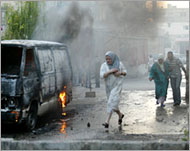Abbas: Stop giving Israel excuse to hit
President Mahmoud Abbas has told armed Palestinian factions to stop giving Israel excuses to carry out attacks after it announced a zero-tolerance policy and launched air strikes on the Gaza Strip.

“It is so easy for someone to say the occupation is the cause of the problem, but we should not give them the excuse to attack us,” Abbas said on Wednesday, warning that those who take the law into their own hands “should be confronted with an iron fist”.
Artillery batteries and aircraft bombarded open fields in the northern part of the territory after Gaza-based fighters fired a lone rocket into the southern Israeli town of Sderot, causing no casualties.
The Israeli military said the target spot was a launch site for rockets into Israel. Warplanes broke the sound barrier over Gaza City unleashing deafening booms for a second night running, an AFP correspondent said.
Earlier, Abbas said there was no need to form a new Palestinian government to replace the present one headed by Prime Minister Ahmed Qureia.
Two major issues
Speaking before the Palestinian legislative council in Ram Allah, he said the proximity of the parliamentary elections, scheduled for 25 January, made the formation of a new government problematic and unnecessary.
His speech tackled the two major issues of government and the prevailing security situation in the Palestinian territories.
 |
|
Abbas ruled out the formation of |
“We simply don’t have sufficient time to form a new government in light of the approaching elections,” Abbas said.
He said a new government would be formed after the January elections, which he said would be its own master and devote itself to tackling the national burdens and the “many problems” facing the Palestinian people.
Abbas said a final date for his long-awaited meeting with Israeli Prime Minster Ariel Sharon had not been designated.
“We agreed to postpone the meeting because preparations were not adequate, and when these preparations are complete, we will proceed with the meeting.”
Sharon and Abbas were supposed to meet prior to the latter’s recent visit to Washington.
Huge gaps
However, it was obvious that the gaps in the positions of Israel and the PA on many issues were so huge that any meeting would have ended in failure.
In his address before the legislative council, Abbas vowed to hold the elections on time, saying that the PA rejected Israeli pressure to exclude Hamas from participation in the elections.
|
“It is so easy for someone to say the occupation is the cause of problem but we should not give them the excuse to attack us” Mahmoud Abbas, |
Abbas did not elaborate on the latest escalation of violence, including the Israeli assassination of resistance group Islamic Jihad’s top fighter Luai al-Saadi in Tulkarim on Sunday as well as the ongoing sweeping arrests of hundreds of Hamas political activists.
Speaking about the Palestinians in refugee camps in Lebanon, he said they should not intervene in the country’s internal affairs.
With regard to the security situation in the Palestinian territories, Abbas hinted that he had taken a firm decision on this count. He said he was determined to unify the PA’s ranks, weapons and judicial authority.
Security inadequacy
However, Abbas also hinted he does not possess the required equipment to control this situation and end the security disorder and chaos in these territories.
Also speaking before the council was the beleaguered Prime Minister Ahmed Qureia, who told lawmakers that the crisis facing the PA was so deep, so real and multifaceted that “no one side” can tackle it alone.
“I tell you in all honesty that no one side alone can control the security situation.
 |
|
Palestinians in Lebanon were told |
“Our situation is different from any other country. Our ability to act is limited. Israel is closing in on us with this wall, and Jerusalem is being devoured and annexed and the settlement blocks are grabbing more and more of our land.”
Qureia said his government was doing its best, adding that people should always remember that the government is operating under the Israeli occupation.
He also said the PA had begun absorbing “wanted persons” affiliated with Fatah’s armed wing, al-Aqsa Martyrs Brigades.
The Palestinian prime minister stressed the “paramount importance” of reforming and reorganising the PA security agencies.
“We will be able to hold the security forces accountable for their actions and behaviour, something that didn’t exist in the past.”
Dismissal vote
The Palestinian legislative council voted overwhelmingly earlier this month to recommend the dismissal of the government, blaming it for internal chaos, rampant crime and lawlessness.
Meanwhile, an opinion poll conducted by the Bait Sahur-based Centre for Public Opinion studies showed that more than 61% of Palestinians support the formation of a new government.
|
“We will be able to hold the security forces accountable for their actions and behaviour, something that didnt exist in the past” Ahmed Qureia, |
The survey, published on 26 October, also showed that nearly 65% of Palestinians are worried about their personal safety and security due to rampant violence and lawlessness.
As for political currents and support for various politicians and factions in the occupied territories, the survey showed that imprisoned Fatah leader Marwan al-Barghuthi enjoyed the largest support in comparison to other politicians, with nearly 25% of the respondents saying he should be the PA’s next prime minister.
Hamas’s Gaza spokesman Mahmoud al-Zahar came next, with slightly more than 14% saying he should form the next Palestinian government.
Fatah, the de facto ruling party of the PA, enjoyed the support of 37.6% of respondents while Hamas and the Islamic Jihad combined enjoyed the backing of up to 31%.
All leftist groups, including PFLP, FIDA, DFLP, Popular struggle Front, Palestinian National Initiative, People’s Party and Arab Liberation Front, enjoyed no more than 10.5%-backing, according to the poll.
Aljazeera’s Palestine bureau chief Walid al-Umari in Ram Allah contributed to this report.